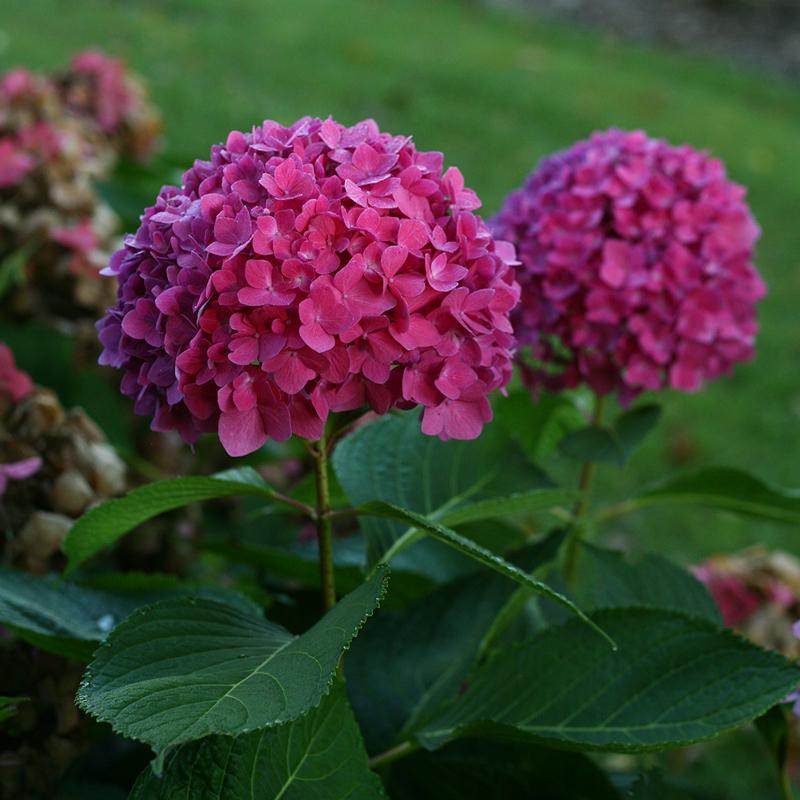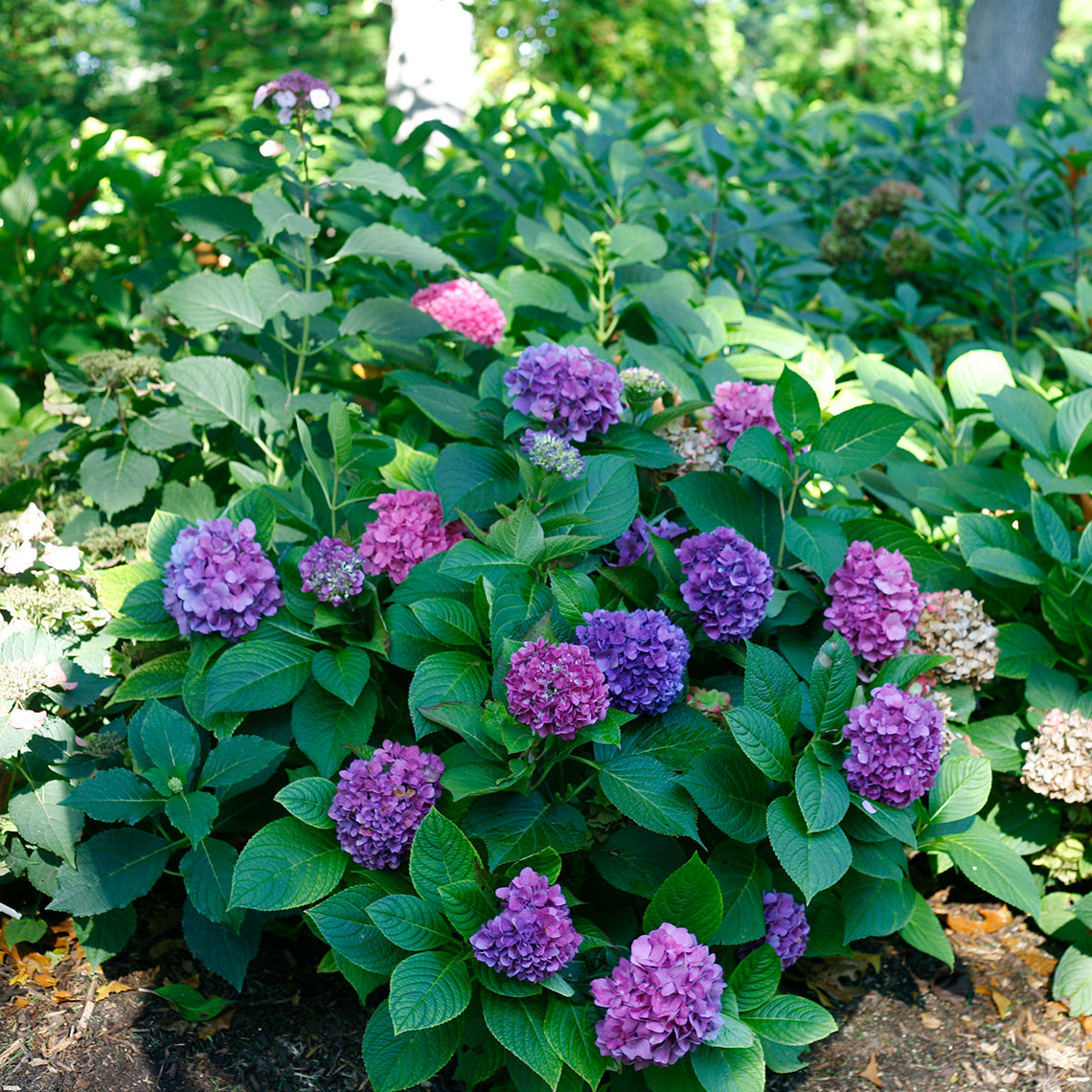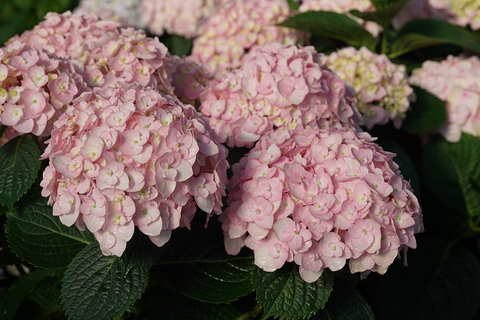Contents:
Bigleaf hydrangeas are the one that comes to mind when most people think of a hydrangea - they're the ones with the big, round flowers in blue, purple, or pink. Unfortunately, they're also the ones that most people have had the most difficulty growing successfully, because even though the plant itself can tolerate cold conditions, the flower buds - which are kept on the plant all winter long - can be damaged by extreme winter cold and spring frosts. Our guide here will help you understand how to properly site, grow, and care for a bigleaf hydrangea, ending hydrangea disappointment for good!
Hardiness/climate
Bigleaf hydrangeas are cold tolerant to USDA zone 5 and heat tolerant through USDA zone 9. They are native to mild coastal regions of Japan, and this is one reason why they are so associated with seaside areas in North America as well. While a bigleaf hydrangea plant can survive USDA zone 5 (and many even USDA zone 4), the problem that often arises in these areas is that the flower buds, which are present on the plant during winter, can be damaged by cold. If this happens, poof! There go the flowers for the year - hence the high level of confusion and disappointment associated with these beautiful plants.
Siting (in other words, where in your yard you plant something) can make a huge difference in your success and satisfaction with these plants. In cold climates, plant them where they are protected from frigid Westerly winds and weather, such as on the east side of your home, or surrounded by walls or other structures. In hot climates, planting where the hydrangea will be completely shaded during the hottest part of the day is key to keeping the plant happy and stress-free.
Size
Old-fashioned bigleaf hydrangeas can reach large proportions, around 5-6' in much of North America. This large size often results in people pruning them to try to control the height, and that removes flower buds, once again resulting in a non-flowering plant. Fortunately, there are lots of smaller, more compact varieties available these days which allow people to plant hydrangeas where they want them without having to prune them and risk losing flowers. When it comes to planting a bigleaf hydrangea, it's crucial to select the right mature size for the site so that you don't need to prune them at all.
Light
In USDA zones 4-6, bigleaf hydrangeas can take full sun, especially if they are mulched, and/or if they get regular irrigation. In USDA zones 7-9, a bit of morning sun or filtered light all day is best, and plants should absolutely be planted where they will get shade during the hottest part of the day. Though many people do think of bigleaf hydrangeas as shade plants, some sun each day will result in the best flower color, strongest stems, and ultimately, more abundant flowering as well.
Soil
Moist, well-drained soil is best for bigleaf hydrangeas. They wilt easily, so a steady supply of moisture will keep your plant looking its best. A good 2-3" layer of mulch is also really crucial in all climates, all year-round. As for soil pH, it is a myth that bigleaf hydrangeas require acidic soil - they can actually grow well in acidic to slightly alkaline (pH 7.5+) soils. The pH of the soil impacts the flower color of most varieties, however - scroll down to the color section for more information.
Fertilizer
An application of a granular rose fertilizer in early spring is recommended for all bigleaf hydrangeas. In areas of extreme pH, either acidic or alkaline, yellow or pale leaves may develop and fertilizer will mitigate that. Fertilizing monthly from early spring through late July is recommended for reblooming bigleaf hydrangeas, as this goes a long way toward encouraging the consistent, vigorous growth that is required for the formation of new wood flowers later in the season.
Flower Color
The color of bigleaf hydrangea flowers can famously vary from blue to pink, depending on the soil. Many think that blue flowers develop in acidic soils, and pink in neutral to alkaline soils, and while that is true, it's not the whole story. There also must be aluminum, a mineral that naturally occurs in many soils, present, for blue color to develop. So it is completely possible to have acidic soil and not get blue flowers due to the absence of aluminum. Generally speaking, the color that you see in other bigleaf hydrangeas in your neighborhood or town can indicate what color hydrangeas planted in your yard will bloom with.
It's important to note that whether you are buying a bigleaf hydrangea online or in a garden center, it will most likely bloom pink unless it was specifically treated to bloom blue. This is because commercial growing media does not contain aluminum. However, a year or so after planting, the flower color will reflect the conditions of the soil you planted it in.
Pruning
Great news! In general, you should avoid pruning bigleaf hydrangeas entirely. Because they bloom late in the season on old wood, there is no time that they can be pruned without negatively impacting flowering either during the current season or the following one. It is okay to remove entire branches of bigleaf hydrangeas, however, they should never be cut back or trimmed the way you might other shrubs. Even if you have a reblooming bigleaf hydrangea that blooms on both old and new wood, you should treat it as a strictly old wood blooming type and avoid pruning it. This ensures the most possible flowers.
In cold climates, once the new growth begins to appear on the stems, you may find portions of the stems that have died. These can be pruned off just above where the new growth can be seen. If your plant has lots of dead wood year after year, that may indicate the spot where it is planted isn't suitable for a bigleaf hydrangea, and you should consider moving it.
Bigleaf hydrangea problems
Like most hydrangeas, bigleaf hydrangeas are largely unbothered by pests and diseases, and the ones that do occur are rarely serious. Here are a few issues to look out for.
Diseases
Some bigleaf hydrangeas, particularly older varieties, are susceptible to powdery mildew. This can be managed by providing good air circulation (move any plants that are crowding it), avoiding pelting the leaves with water when you irrigate, and cleaning up any fallen foliage in autumn, as the mildew spores will overwinter on it and re-infect the plant the following spring if conditions are right. If your plant consistently gets powdery mildew in its spot, consider moving it.
Bigleaf hydrangeas also get other leaf spots, like alternaria and cercospora. These similar-looking fungal leaf spots manifest as brownish-purple dots on the leaves, ranging from tiny to quite large. They usually become more apparent later in summer, and particularly if a plant becomes stressed. These diseases can be managed in the same manner as for powdery mildew above.
Insect pests
Bigleaf hydrangeas are generally unbothered by insects. Any chewing that is seen typically does not require management of any kind.
Other animals
Slug damage is common on bigleaf hydrangeas, especially those in moist, shaded areas. Slugs can be trapped and discarded, or tolerated - they usually only bother the portions of the plant closest to the soil.
Deer are often an issue for big leaf hydrangeas, and though they rarely cause serious damage to the plant, they often eat the flower buds in spring. If deer are an issue in your area, protect plants with a repellent or netting to ensure you get a good bloom.






